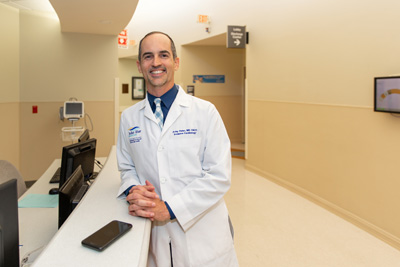
According to invasive cardiologist Dr. Arley Peter, vice-chair of cardiology at Cleveland Clinic Indian River Hospital, the way many heart diseases and conditions are diagnosed and treated is about to take a dramatic turn for the better.
Better still, you probably already own – and regularly use – the requisite hardware needed for that to happen.
It’s your smartwatch or smartphone.
The National Institutes of Health agrees with Peter’s assessment: “The ever-increasing penetration of smartphones [and smartwatches] coupled with embedded sensors and modern communication technologies, make them an attractive technology for enabling continuous and remote monitoring of an individual’s health and well-being with negligible additional costs.”
Indeed, says NIH, the sensors in smart devices “can be used to measure several health parameters such as heart rate and heart rate variability, turning these communication devices into a continuous and long-term health monitoring system.”
A series of articles in the Journal of the American College of Cardiology goes even further. “The future of cardiovascular care,” these articles concur, “will be transformed by advances in digital health technology and mobile devices as a means to prevent and treat heart disease.”
MedicalXPress.com goes further still, saying smartphone and smartwatch heart monitoring “could be up to five times more effective at diagnosing heart problems than standard tests.”
The key words there, for the present anyway, are “could be.”
This is a rapidly evolving but still nascent field.
For instance, detecting the underlying cause of a heart rhythm problem after it is detected by a smart device is often difficult because by the time the patient makes it to the hospital or doctor’s office, they may have recovered and a new electrocardiogram (ECG) of their heart may appear normal.
Nevertheless, Peter interjects that he knows from firsthand experience that some of the existing hardware and software (or “apps”) have proven themselves when it comes to detecting arrhythmias.
“Last week, a lady came to my office and her Apple watch was telling her, ‘You are having a cardiac arrhythmia,’” Peter says.
However, the woman didn’t have any history of arrhythmias.
“So, I first say to myself this woman has given me wrong information,” Peter recalls, “but then I run a test in the office and my test confirms that she was, indeed, having it.”
Of course, smartphones and smartwatches depend on their software or apps, and as Harvard Medical points out, “health-related smartphone and smartwatch apps are a dime a dozen,” but it also says some apps have already proved they can help consumers “make faster and better-informed treatment decisions.”
As the hardware and software continues to evolve, these devices will likely play an increasing role in saving lives.
For now, the best advice is probably to talk with your primary care physician or cardiologist about which device or devices and which apps are best suited to monitoring your particular medical condition.
The KardiaMobile app, for instance, gets high marks from Peter.
Among other things it records your heart activity for 30 seconds and then displays the tracing, which patients can then transmit to their doctor. Other popular phone or watch cardio apps include Cardiogram, HeartWatch, Heart Analyzer and Talking Heart Rate.
Peter says, “With the watch technology and smartphone technology the patient is empowered. They can monitor themselves for a longer period of time. So the longer the time, the greater the likelihood of detecting their cardiac arrhythmias.”
Cleveland Clinic’s own Journal of Medicine agrees. “Integration of ambulatory ECG technology with smartphone and watch technology is an exciting new wearable option for arrhythmia detection. The patient-centered and controlled nature of these devices have the potential to help patients with palpitations or other symptoms determine if their cardiac rhythms are normal.”
Dr. Michael McConnell, clinical professor of cardiovascular medicine at Stanford University, sums up the opportunity these devices offer by saying, “Only recently has the medical community started to embrace the reality that most ‘health’ takes place outside the hospital and clinic, namely the daily activities and clinical events that occur in the other 362 days per year when people are not being seen by a clinician.”
Smartphones, smartwatches and ever-evolving new apps appear poised to fill in that monitoring void.
Dr. Arley Peter is an Invasive Cardiology specialist and Vice-Chief of Cardiology at Cleveland Clinic Indian River Hospital. His office is at 787 37th Street, Suite E260. The phone number is 772-999-3996.



